Unit 2 I’ll help to clean up the city parks.巩固练习
八年级英语下册教案:Unit 2 I’ll help to clean up the city
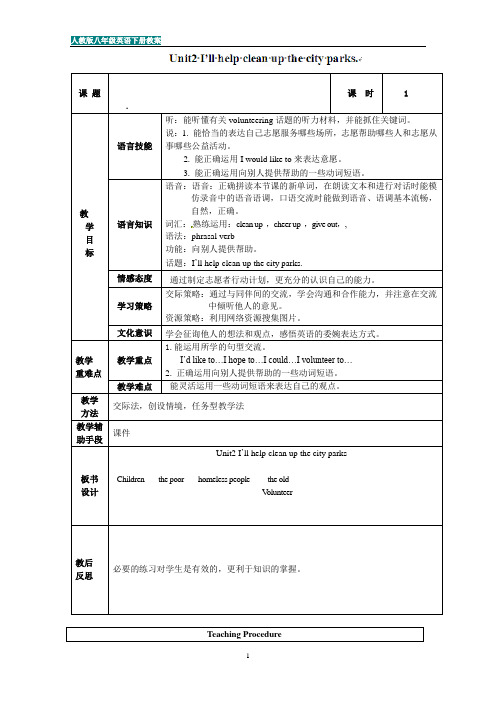
课题.课时 1教学目标语言技能听:能听懂有关volunteering话题的听力材料,并能抓住关键词。
说:1. 能恰当的表达自己志愿服务哪些场所,志愿帮助哪些人和志愿从事哪些公益活动。
2. 能正确运用I would like to来表达意愿。
3. 能正确运用向别人提供帮助的一些动词短语。
语言知识语音:语音:正确拼读本节课的新单词,在朗读文本和进行对话时能模仿录音中的语音语调,口语交流时能做到语音、语调基本流畅,自然,正确。
词汇:熟练运用:clean up ,cheer up ,give out,,语法:phrasal verb功能:向别人提供帮助。
话题:I’ll help clean up the city parks.情感态度通过制定志愿者行动计划,更充分的认识自己的能力。
学习策略交际策略:通过与同伴间的交流,学会沟通和合作能力,并注意在交流中倾听他人的意见。
资源策略:利用网络资源搜集图片。
文化意识学会征询他人的想法和观点,感悟英语的委婉表达方式。
教学重难点教学重点1.能运用所学的句型交流。
I’d like to…I hope to…I could…I volunteer to…2. 正确运用向别人提供帮助的一些动词短语。
教学难点能灵活运用一些动词短语来表达自己的观点。
教学方法交际法,创设情境,任务型教学法教学辅助手段课件板书设计Unit2 I’ll help clean up the city parksChildren the poor homeless people the oldV olunteer教后反思必要的练习对学生是有效的,更利于知识的掌握。
Teaching ProcedureStages/TimingTeachet ers’ activities Students’ activities MethodologyStep 1 Warming upStep 2 lead-inStep 3 practice T: Could you please help me close thedoor?Could you please help me open thewindow?Thanks for your help.Do you know there is a special day inDecember. On that day, many peoplewo uld like to help others who need help.Do you know when is it and what day is itthat day?Introduction of “International V olunteerDay”Time: December 5th.They give people help without hope ofrewardLet’s enjoy some pictures.Show some pictures.They help to sent food to the poor people.They help to examine the health conditionof the old.They help to cut the hair of the poor.They help to clean the yards of thecommunity.They help to clean the bus-stop.What else could we do to help people?Show some other pictures.I’d like to/I hope to/I could/I volunteerto:help children with their schoolwork.visit the old in an old people’s home.help watch the traffic.give our old boo ks to “Hope School”.cheer up sick kids in the hospital.…1a. Look at the ways y ou could helppeople in thepicture. Then list other ways.Other ways you could help people___________________________________________________________________________________________________Ss do it.Ss think about it.Ss: They help to sentfood to the poorpeople.They help toexamine the healthcondition of the old.They help to cut thehair of the poor.They help to cleanthe yards of thecommunity.They help to cleanthe bus-stop.What else could wedo to help people?Ss: I’d like to/Ihope to/I could/Ivol unteer to:Ss do 1a.复习,进一步巩固落实。
八年级英语下册 2 I'll help to clean up the city par
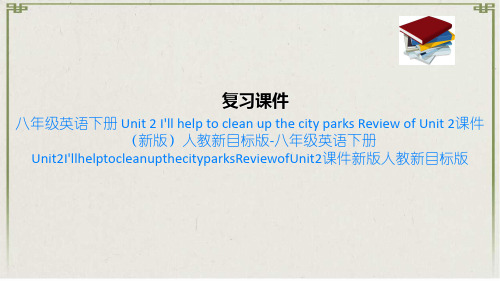
3. As a volunteer, the girl wants to visit sick kids in
the hospital _______ them up.
A. to cheer
B. cheer
C. cheering
D. cheered
短语动词
短语动词是由动词加介词、副词或 其他词构成的固定词组或习语,其作用 和动词相近。
9. I’m __e_x_c_it_e_d_ (excite) about your change. I’m happy you are a good student now.
三、单项选择。
1. The teenagers often help ______ water and
food to those people in need.
5. I’m able to have a “dog helper” because of your _k_i_n_d_n_e_s_s (kind).
6. Do you have any __d_i_ff_i_c_u_lt_ie_s__ (difficult) in learning English?
viewofUnit2课件新版人教新目标版
看看远处,要保护好眼睛哦~站起来
动一动,久坐对身体不好哦~
3. It took me _se_v_e_r_a_l (一些) days to finish the work. 4. To our __j_o_y__ (高兴), we arrived home before it
7. After six months of __tr_a_i_n_in_g__ (train), he is now good at playing basketball.
八年级英语下册 Unit 2 I'll help to clean up the city (1)
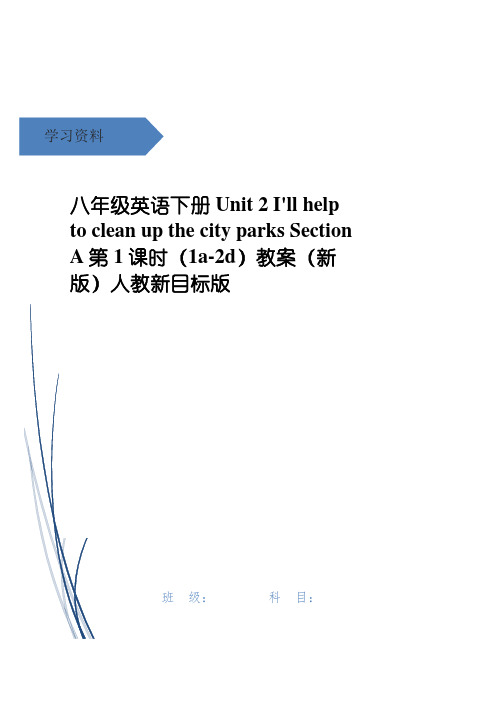
学习资料Unit 2 I'll help to clean up the city parks Section A第1课时(1a—2d)Section A 单词cheer v。
欢呼;喝彩 volunteer v。
义务做;自愿做n。
志愿者sign n.标志;信号notice n.通知;通告;注意 v.注意到;意识到lonely adj。
孤独的;寂寞的several pron.几个;数个;一些strong adj.强烈的;强壮的feeling n.感觉;感触satisfaction n。
满足;满意 joy n。
髙兴;愉快owner n.物主;主人 journey n。
(尤指长途)旅行;行程raise v.募集;征集alone adv。
独自;单独midnight n。
午夜;子夜短语clean up打扫(或清除)干净cheer up (使)变得更高兴;振奋起来give out分发;散发come up with想出;提出(主意、计划、回答等)put off推迟hand out 分发call up打电话给(某人);征召used to曾经……;过去……care for照顾;非常喜欢try out参加……选拔;试用句型1.They told me stories about the past and how things used to be.他们给我讲过去的生活经历,讲过去是什么样子的。
2.…but I want to learn more about how to care for animals.……但是我想更多地了解如何照料动物。
3。
I can do what I love to do and help others at the same time.我能做我喜欢做的事情,同时也能帮助别人。
Section B 单词repair v。
修理;修补 fix v.修理;安装broken adj。
破损的;残缺的wheel n。
八年级英语下册 Unit 2 I’ll help to clean up the city park

Unit 2 I’ll help to clean up the city parks.Section A 第1课时(1a〜2d)自主学习方案1. 自学生词,并记住拼读及拼写。
2. 预习课本,找出重点短语及句子。
3. 读记后完成自学导练作业。
课堂导学方案Step 1情景导入T:Do you know a volunteer? Do you know what the volunteers do?S1:They help the old people.S2:They help do some cleaning.…T :What can you do? Now please talk about the questions in groups.环节说明:由志愿者的活动过渡到学生讨论的话题,衔接自然,学生易于接受,能勾起学生的学习欲望。
Step 2完成教材1a—1c的任务1. 认真观察1a中的图片,写出图片中帮助他人的方法,然后写出其他帮助他人的方式。
完成后小组内交流看谁写得多。
2. 认真阅读1b中的句子,然后听听力完成1b任务。
3. 再听一遍录音,并跟读对话。
4. 结对练习1a图片中的对话,并请一些学生表演出他们的对话。
然后模仿1b材料编新的对话并表演。
5. 小结训练。
( B )I took my sister to the concert to .A. cheer up her B . cheer her upC . cheer she up D. cheer up she环节说明:听说结合,第一时间向学生传达语言目标,通过结对对话练习和小结训练,使语言目标得以强化。
Step 3 完成教材2a—2c的任务1. 认真观察2a中的图片,然后听录音圈出他们打算要做的事情。
2. 再听一遍录音,根据录音内容完成2b中的填空,然后大声地朗读五个句子。
3. 听第三遍录音,学生跟读,然后仿照2c的形式编对话。
Step 4 完成教材2d的任务1. 学生自读对话,回答下面的问题。
《I’ll help to clean up the city parks》Unit 2 Secti
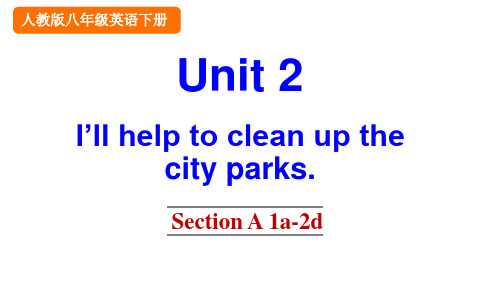
√
√
√
2 Listen again. Fill in the blanks.
b 1. We need ctom_e__u_p_ _w_i_th_ _____ a plan to
tell people
school study program to teach kids.
___1__ The boy could help to clean up the
city parks.➢Fra bibliotekPair work
1 Practice the conversation in the picture
c
above. Then make other conversations using the information in 1b.
2 Role-play the conversation.
d Helen: Hi, Tom. I’m making some plans to work
in an old people’s home this summer. Tom: Really? I did that last summer! Helen: Oh, what did they ask you to help out
I’d like to put up signs/ notices.
I’d like to hand out advertisements.
I’d like to give a hand in an old people’s home!
2 A group of students are planning a City Park Clean-Up Day. Listen and check(√)
八年级英语下册(人教版)Unit 2 I'll help to clean up the city

作业布置落实双减政策,减量不减质,重视实际场景的交际应用,减轻机械操练。
板书设计
Unit2 I'll help to clean up the city parks.
Section B 1a-1e
评价反馈
教学反思
任务型教学法的采用强化了学生对文本的理解;以学生为本,构建有效的对话情境,引导学生自主合作;突出语言的语用功能,通过学科整合进行拓展,让学生学以致用,提升了学生的综合语言运用能力。不同形式的朗读及角色扮演,训练了学生使用正确的语音、语调,并在具体的语境中落实了核心句型的运用。板书简洁清晰,重点突出,对学生的复述起到了很好的辅助作用。
头脑风暴培养学生的交际能力和创编能力。
Part5:ຫໍສະໝຸດ 回顾总结(2min)Summarize the key content in this lesson.
跟随老师一起进行内容总结。
总结本课所学内容,巩固加深印象。
利用将思维导图给学生进行有序的梳理。
Part6:
考点速递
(5min)
T explainsknowledge points.
学情分析
通过前面的学习,学生已经能够运用部分短语动词(如give out,clean up等)来表达多种多样的志愿服务活动,并且对动词不定式在英语句子中所充当的成分和作用也有一定的了解。本课时的生词和短语不多,听力内容故事性强,结合图片信息,可以提高学生的学习兴趣,主要帮助学生利用所学短语动词对听力内容进行加工、准确输出。
基于课程标准的“教-学-评”一致性课堂教学设计
科目
英语
授课教材
人教版八年级上册
授课题目
Unit2 I'll help to clean up the city parks.
人教新目标英语八年级下册:Unit 2 I'll help to clean up the city

Unit 2 I’ll help to clean up the city parks.Name Group ClassPeriod 4Section B 1a-2e【Topic】Volunteering and charity【Get ready before class】温故知新一、选词填空:cut up, give out, come up, clean up, put off, cheer up, call up, help with, write down.1. Please ___________________ the table after supper.2. He________________ with a good idea yesterday.3. Your daughter is sad. Why not __________her________?4. Teachers _______________ apples to every child.5. We ______________ the party because it rained very hard that day.6. _______________ these potatoes. I’ll cook them.7. I will _______________ some housework after I finish my work.8. Please _______________ what I said just now.9. He ______________ his wife as soon as he arrived in Shanghai.二、Fill in the blanks.用做给词的适当形式填空1. My brother wants ___________ (be) a pilot.2. You’ll never learn _____________ (ride) a bike if you don’t practice.3. Mike taught his grandpa how ____________ (use) the computer.4. The students decided ______________ (work) out the problem by themselves.5. He volunteers _____________ (work) on the farm.6. We can make plans ____________(visit) the old people in the old people’s home.7. We can do what we can do ___________(help) other people.新知探究一、Listen and read the new words. 预习生词,摘抄并翻译单词所在的句子.repair: ( )( )fix: ( )( )broken: ( )( )disabled: ( )( )二、Read the sentences in 1a and finish 1a and 1b.三、词海拾贝。
Unit 2 I'll help to clean up the city parks Sectio

Unit 2I ll help to clean up the cityparks.Section A(1a-2d)1.Train students listening and speaking skills.2.Train students to express offering help with the target language.3.Learn to pay close attention to the society and care for others.1.Learn to talk about how to offer help.2.Learn to use the infinitives and new phrasalverbs.Step ⅠLeading inMethod One:Leading in by asking the following questions:Do you want to be a volunteer?What would you like to do to help others?Who needs help?Discuss the questions in groups.Method Two:Show some pictures of people who need someone s help to the students,for example,sick people,homeless children,hungry peopleT:Do you like these pictures?S1:No,they make me sad.T:What can you see in the pictures?S2:There are some people who need help.T:Can you tell me something about the pictures?S3:The children are very poor,and they don t have money to go to school...T:What can you do for them?S4:I can donate some books and clothes to them.Also I can save money to help them.T:Well,you re a kind boy/girl.Today we ll learn something about volunteers.Step ⅡPresentation1a.Point to the pictures,asking students to read the statements under the title of “Volunteer Today”.Call students attention to the language points,and make sentences using some phrases.Ask students to read the sentences in the picture again,and describe what the volunteers are doing in the three posters.For the first poster,students will say:There is trash in the park.There are several pieces of paper on the ground.We can help to clean up the park by picking up the paper and trash.So the park will be clean.After students finish the rest of the posters,ask them to write down other ways to help people in the box below the posters.1b.Call students attention to the sentences and scan four statements to get the topic idea.Play the tape.For the first time,students only listen and get the main idea.The second time,students listen and number the ways the boy and girl could help others.After they finish listening,invite a student to present his or her answers.Ask students to read the sentences again and explain the language points to the class.1c.Call students attention to the conversation in 1a,and ask students to demonstrate it to the class again.Read the instructions to the class.Have students work in groups to finish the task,and then invite students to share their work with the class.Sample conversation:S1:I hope to help the homeless people.S2:You could give out food at the food bank.Step ⅢListeningShow the pictures in 2a.Have students talk about the plan of each picture.a.advertise on TVb.put up signsc.call up othersd.advertise in the newspapere.give out advertisementsT:A group of students are planning a City Park Clean-Up Day.They are talking about ways to tell people about the Clean-Up Day.Let s listen and finish 2a.Check the answers.Play the tape again for the students and let them do 2b by themselves.Have students listen again and check the answers.Step ⅣPair WorkHave students read the conversations in 2c first.Then work in pairs to make a conversation according to 2a and 2b.Then ask two pairs to present their conversations to the class.T:Lei Feng Day is one week from now.We need to come up with a plan.What would you like to do?Talk with your partner and come up with a plan.A:We need to come up with a plan for Lei Feng Day.B:Let s have lunch first.A:No,Lei Feng Day is only one week from now.We can t put off making a plan.B:...Ask some pairs to act out their conversations.Step ⅤRole-play the conversation2d.First,give students several minutes to practice reading the conversation with deskmates.Ask them to pay attention to the pronunciation and intonation,and underline some difficult expressions at the same time.After they finish reading,invite some pairs to role-play it.Lead students to read the conversation sentence by sentence and correct their pronunciation mistakes.Finally,analyse some language points.Step ⅥSummaryIn this class,we ve learned how to express offering help.In the process of teaching,we ve learned some phrases and done much listening and speaking practice using the target language.1.Recite the key words and phrases.2.Preview the next period.。
Unit 2 I'll help to clean up the city parks.
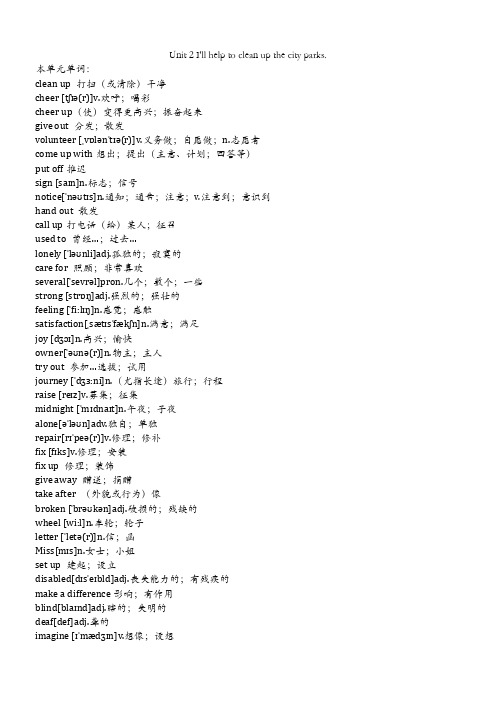
Unit2I'll help to clean up the city parks.本单元单词:clean up打扫(或清除)干净cheer[tʃɪə(r)]v.欢呼;喝彩cheer up(使)变得更高兴;振奋起来give out分发;散发volunteer[ˌvɒlənˈtɪə(r)]v.义务做;自愿做;n.志愿者come up with想出;提出(主意、计划;回答等)put off推迟sign[saɪn]n.标志;信号notice[ˈnəʊtɪs]n.通知;通告;注意;v.注意到;意识到hand out散发call up打电话(给)某人;征召used to曾经…;过去…lonely[ˈləʊnli]adj.孤独的;寂寞的care for照顾;非常喜欢several[ˈsevrəl]pron.几个;数个;一些strong[strɒŋ]adj.强烈的;强壮的feeling[ˈfi:lɪŋ]n.感觉;感触satisfaction[ˌsætɪsˈfækʃn]n.满意;满足joy[dʒɔɪ]n.高兴;愉快owner[ˈəʊnə(r)]n.物主;主人try out参加…选拔;试用journey[ˈdʒɜ:ni]n.(尤指长途)旅行;行程raise[reɪz]v.募集;征集midnight[ˈmɪdnaɪt]n.午夜;子夜alone[əˈləʊn]adv.独自;单独repair[rɪˈpeə(r)]v.修理;修补fix[fɪks]v.修理;安装fix up修理;装饰give away赠送;捐赠take after(外貌或行为)像broken[ˈbrəʊkən]adj.破损的;残缺的wheel[wi:l]n.车轮;轮子letter[ˈletə(r)]n.信;函Miss[mɪs]n.女士;小姐set up建起;设立disabled[dɪsˈeɪbld]adj.丧失能力的;有残疾的make a difference影响;有作用blind[blaɪnd]adj.瞎的;失明的deaf[def]adj.聋的imagine[ɪˈmædʒɪn]v.想像;设想difficulty[ˈdɪfɪkəlti]n.困难难题open[ˈəʊpən]v.开;打开door[dɔ:(r)]n.门carry[ˈkæri]v.拿;提;扛train[treɪn]v.训练;培训excited[ɪkˈsaɪtɪd]adj.激动的;兴奋的training[ˈtreɪnɪŋ]n.训练;培训kindness[ˈkaɪndnəs]n.仁慈;善良clever[ˈklevə(r)]adj.聪明的;聪颖的understand[ˌʌndəˈstænd]v.理解;领会change[tʃeɪndʒ]v.&n.变化;改变interest[ˈɪntrəst]n.兴趣;关注v.使感兴趣;使关注sir[sɜ:(r)]n.先生(用于正式信函中对不知名的男性收信人的称呼时,写为Sir)madam[ˈmædəm]n.夫人;女士(用于正式信函中对不知名的女性收信人的称呼时,写为Madam)Mario['mærɪəʊ]马里奥(男名)Jimmy[ˈdʒɪmi]吉米(男名)重点单词详解:1.clean up意为“打扫(或清除)干净,是“动词+副词”结构的短语例句:He often helps his parents clean up their room on weekends.You room is diety.You should clean it up.注意:“动词+副词”结构的短语a.后跟名词作宾语时,名词可放在动词和副词之间,也可放在副词后;b.后跟人称代词作宾语时,人称代词要放在动词和副词之间;【拓展】clean-up用作名词,意为“打扫;清洁”例句:We must give our classroom a good clean-up.中考链接:Many volunteers will help to the city parks next Friday.A.give upB.pick upC.clean up2.cheer v.欢呼;喝彩3.cheer up“使变得更高兴;振奋起来”,是“动词+副词”结构的短语Tips:cheer up既可作及物动词短语,也可以作不及物动词短语;人称代词作宾语时,必须放在cheer与up之间例句:He cheered up at once when I agreed to help him.He took her to the cinama to cheer her up.中考连接:David failed in the singing competition.He's very sad now.Let's go to.A.wake him upB.cheer him upC.pick him upD.take him up4.give out意为“散发;分发”,相当于hand out,是“动词+副词”结构的短语;例句:We'll give out notices at the supermarket after school.【拓展】give out的其它含义:(1)意为发出(光、热、声音、气味等)例句:The sun gives out light and heat.(2)意为“用完;耗尽”例句:Our supplies are giving out.中考链接:—Would you please help me the invitations to all my friends.—Sure.You'd better let me know their phone number.A.make upB.clean outC.give out5.volunteer此处用作不及物动词,意为“自愿做;以为做”,后常跟介词in,for等例句:They volunteer for the work in the club.【拓展】(1)volunteer也可用作及物动词,意为“自愿做;义务做”;短语:volunteer to do sth.意为“自愿做某事”例句:Jenny volunteered to clean up the room after the party.(2)volunteer还可用作可数名词,意为“志愿者”例句:I want to be a volunteer in the city.e up with意为“想出、提出(主意、计划、回答等),相当于think up;例句:Can't you come up with a better idea?【拓展】come的其它常用短语有:come over过来;顺便来访;拜访come in进来come on快点;加油come out出来;开花;(书等)出版come up走近;走上前来come down下来come from来自come true实现中考链接:—I've made much progress in grammar.The ideas you worked out fine.A.came up withB.ran out ofC.look up to7.put off“推迟”,是“动词+副词”结构的短语,其后常跟名词、代词、动词-ing形式等作宾语;例句:They put off the match because of the heavy rain.Please don't put off doing your homework.【拓展】put的常用短语还有:put up张贴;搭建;举起put back放回原处;把钟拨慢put out熄灭put down放下put one's hear into全神贯注于put on穿上;上演;发胖put away收起来;放好中考链接:—Let's go out for dinner.—Great!But Clean-Up Day is two weeks from now.We can't making a plan.A.take offB.see offC.put offD.cut off8.notice用作可数名词,意为“通知;通告;布告”例句:There is a notice on the wall,saying“No Parking”.I'll put up a notice about the meeting.【拓展】notice做动词,意为“注意到;意识到”,其常见用法有:(1)notice sb.do/doing sth.注意到某人做了/正在做某事;例句:I noticed Jim get into the teacher's office.I noticed some sutudents getting off the bus when I walked past the school.(2)notice+that从句“注意到…”例句:She noticed that the old man had trouble breathing.ed to在此表示过去一度存在但现在已经消失的某一特定的情形used to作这一用法讲时,常与be,have,live,stay,like,love等词连用,表示“曾;曾经”;例如:He used to be a climber.I used to live in Hangzhou.【拓展】used to还可用来表示“过去常常”做某事,但现在不那样做了,后接动词原形;例句:We used to take risks when we were children.注意:used to的否定结构通常是“didn't use to”;在英式英语中也常用“used not to”缩写形式为“usedn't”;例句:You didn't use to eat chips when you were young.He used not to smoke.中考链接:—I remember there a lot of fish in Yang-lan Lake.Now it has been polluted.—What a pity!I think we should pay a role in protecting the environment.A.are used to haveB.are used to beed to haveed to be10.lonely adj.孤独的;寂寞的指心灵上的孤独,具有伤感色彩;例句:He felt very lonely without his friends.【拓展】lonely作形容词,还可意为“偏僻的;人迹罕至的”例句:The cabin was built in a lonely spot.11.care for意为“照顾;照料”,其同义短语为“look after”或“take care of”例句:Thanks for caring for me when I was sick last week.【拓展】(1)care for还可意为“非常喜欢”,通常用于否定句或疑问句;例句:I don't care for basketball.(2)care about意为“关心;注意”例句:We should care about the lonely old people.中考链接:—My mum is ill.I have to stay at home and her.—I'm sorry to hear that.I hope she can get better soon.A.look atB.look forC.care for12.several此处用作形容词,意为“几个;数个;一些”,修饰可数名词复数;例句:Several volunteers are trying to cheer up the sick kids in the hospital.【拓展】several作代词,意为“几个;数个”例句:Several of us went there.13.strong为形容词,意为“(能力)强的;擅长的”短语:be strong in=be good at=do well in“擅长…”,其后可接名词、代词或动词-ing形式作宾语例句:He is strong in science.【拓展】strong的其它含义:(1)强壮的;强健的例句:He exercises every day,so he is strong.(2)坚固的;结实的例句:The runner needs a strong pair of shoes.(3)强烈的;厉害的例句:a strong feeling14.feeling n.感觉;感触;情感(可数)表示人的喜、怒、哀、乐或冷、热、累、痛等感受或感觉;例句:I've got a bad feeling.It was a great feeling when I won first prize.助记:feel(v.感受;觉得)+-ing feeling(n.感觉;感触)15.satisfaction用作不可数名词,意为“满意;满足”例句:She smiled in satisfaction.助记:satisfy(v.使满意)去y+action satisfaction(n.满意;满足)16.joy此处用作不可数名词,意为“高兴;愉快”例句:He jumped up with joy.17.owner用作可数名词,意为“物主;主人”短语:the owner of…意为“…的主人”例句:He is the owner of the car.【拓展】(1)own用作形容词,意为“自己的”,一般用于形容词性物主代词或名词所有格之后,以加强语气;例句:I saw it with my own eyes.(2)own用作及物动词,意为“有;拥有”,相当于have;例句:He owns a big house.(3)of one's own意为“属于某人自己的”;on one's own意为“单独地;独自地”,相当于alone;例句:At last I got a big house of my own.He wants to finish the work on his own.18.try out意为“参加…选拔;试用”,当意为“参加…选拔”时常与介词for连用;例句:Over sixty boys came to try out for the basketball team.I'm trying out a new computer.19.journey可数名词,意为“旅行;行程”,一般指长途旅行;例句:Life is a long journey from birth to death.20.raise用作及物动词,意为“募集;征集”常用于短语:raise money for,意为“为…筹钱”;例句:They want to raise enough money for building a school.【拓展】raise 用作及物动词,还可意为“举起;抬起;提高;养育”;例句:Please raise your right hand .Don't raise your voice at me .He raised a large family .21.alone 用作副词,意为“单独;独自”,在句中作状语。
人教版 八年级英语 下册 Unit2 I'll help to clean up the city
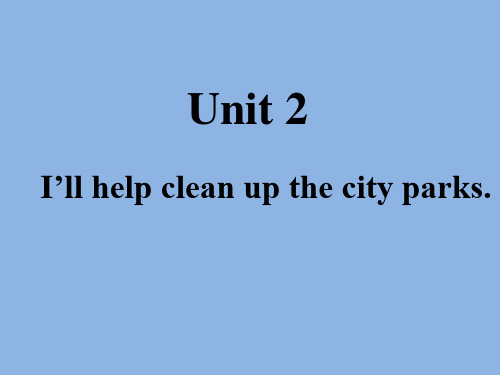
to make
to visit
to move
1a Match the sentences with similar
meanings.
b 1. I’ve run out of it.
c 2. I take after my mother. a 3. I fixed it up. d 4. I gave it away.
I could cook by独自地 myself (when I was ten) at the age of ten 在。。。岁在时候.
5 Volunteering here is a dream come true for me.
在这里当志愿者对我来说是梦想成真。
I got the latest CD player as a birthday present yesterday. It was just a dream come true!
2a Listen and check (√) the things
the students are going to do.
a
b
c
√
d
√
e
√
2b listen again. Fill in the blanks.
1. We need to _c_o_m__e_ __u_p____ _w__it_h___ a plan to tell people about
You could help clean up the city parks
n. 饥饿
Listen and complete the sentences.
1. I hopt to _w__o_rk_ outside. You could help to clean __u_p__ the city parks.
八年级英语下册(人教版)Unit 2 I'll help to clean up the city

总结本课所学内容,巩固加深印象。
利用将思维导图给学生进行有序的梳理。
Part6:
考点速递
(5min)
T explainsknowledge points.
将知识点做好笔记进行理解消化。
将教学落到实处,交际意识培养之后,知识点的教授也跟上,保证学生在理解的同时能够运用到具体题型中去。
2.Tasksstudents tolearn about theintroduction: Ben Smith chose to write a letter to express his thanks. Let’s read his letter and figure out who he wrote to and why he wrote the letter. Before reading, we can have a guess according to the following picture.
根据思维导图复述文章内容。
根据文章内容填空。
学习阅读技巧。
完成书本2c任务。
完成书本2d任务。
完成书本2e任务。
回归课本练习,聚焦文展内容进行适当拓展练习,培养学生的思维能力。
小组合作探究培养学生的探索思维和发散思维,交际意识的提升更有助于素养的发展。
Part5:
回顾总结
(2min)
Summarize the key content in this lesson.
学情分析
通过前面的听、看、说、读活动,学生已经掌握了一定的有关志愿服务、关爱援助的词汇和提建议句型,具备了一定的听、看、说、读技能,对本单元所涉及到的语法知识也有所了解。本课的阅读文本是一封书信,学生对于其语篇基本结构有所了解。在平时的学习中,部分学生只注重单词的词义不注重词性的记忆,借本课阅读策略的渗透,可提醒学生注意改进。
八年级英语下册 Unit 2 I'll help to clean up the city park
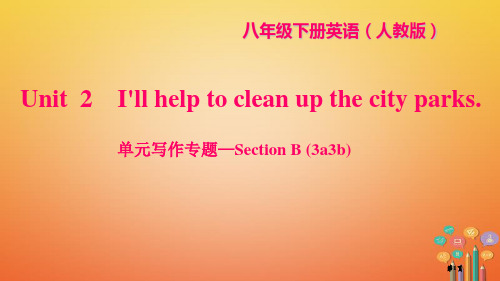
⑥Volunteering here is a dream come true for me. ⑦Lucky makes a big difference to my life. ⑧You helped to make it possible for me to have Lucky. ⑨So I fix up the bikes and then give them away to these kids. ⑩I love animals and I was excited about the idea of having a dog.
第5页
I would like to ________ for charity The International Day of Charity is coming.Many people will do something for it.What should I do? Here are my ideas. I would like to…
第3页
经典范文展示 为迎接国际慈善日(the International Day of Charity)到来,某英文报刊 将要举行有奖征文活动,请你以“I would like to ________for charity”为 题写一篇短文,为此次活动投稿。步骤与关键点以下: 1.确定主题,并在文中说明原因;2.围绕主题,进行叙述;3.写出 详细计划, 也能够讲述一段与主题相关故事或经历。
惯用句型: ①You could help to clean up the city parks. ②The girl could visit the sick kids in the hospital to cheer them up. ③We need to come up with a plan to tell people about the city park cleanup. ④We can't put off making a plan. ⑤I want to learn more about how to care for animals.
Unit2I’llhelptocleanupthecityparks课文讲解知识点练习说课讲解
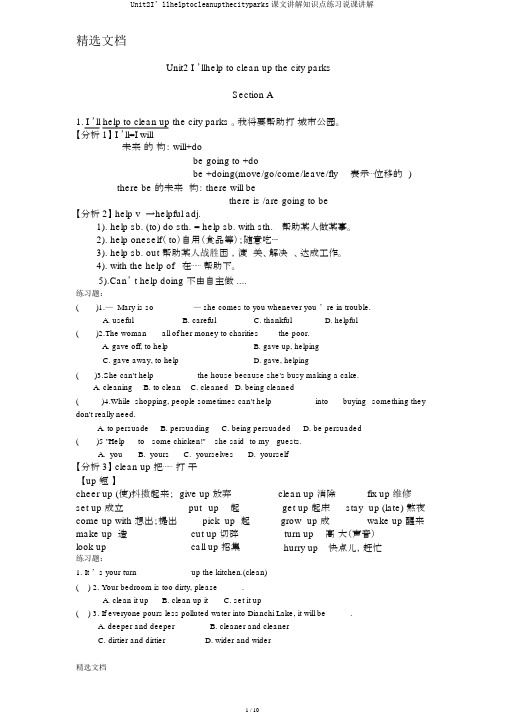
精选文档Unit2 I ’llhelp to clean up the city parksSection A1.I ’ll help to clean up the city parks 。
我将要帮助打城市公园。
【分析 1】 I ’ll=I will未来的构: will+dobe going to +dobe +doing(move/go/come/leave/fly表示⋯位移的) there be 的未来构: there will bethere is /are going to be【分析 2】 help v →helpful adj.1). help sb. (to) do sth. = help sb. with sth.帮助某人做某事。
2). help oneself( to)自用(食品等);随意吃···3). help sb. out 帮助某人战胜困,渡关、解决、达成工作。
4). with the help of在⋯⋯帮助下。
5).Can’ t help doing 不由自主做 ....练习题:()1.— Mary is so ________ — she comes to you whenever you ’re in trouble.A. usefulB. carefulC. thankfulD. helpful()2.The woman ___all of her money to charities____ the poor.A. gave off, to helpB. gave up, helpingC. gave away, to helpD. gave, helping()3.She can't help _________ the house because she's busy making a cake.A. cleaningB. to cleanC. cleanedD. being cleaned()4.While shopping, people sometimes can't help _________ into buying something they don't really need.A. to persuadeB. persuadingC. being persuadedD. be persuaded()5 "Help___to some chicken!"she said to my guests.A. youB. yoursC. yourselvesD. yourself【分析 3】 clean up 把⋯⋯打干【up 短】cheer up (使)抖擞起来; give up 放弃clean up 消除fix up 维修set up 成立put up 起get up 起床stay up (late) 熬夜come up with 想出;提出pick up 起grow up 成wake up 醒来make up 造cut up 切碎turn up高大(声音)look up call up 招集hurry up快点儿,赶忙练习题:1. It ’s your turn ____________up the kitchen.(clean)() 2. Your bedroom is too dirty, please _____.A. clean it upB. clean up itC. set it up() 3. If everyone pours less polluted water into Dianchi Lake, it will be _____.A. deeper and deeperB. cleaner and cleanerC. dirtier and dirtierD. wider and wider( )4 . —Diaoyu Island belongs to China.— Surely it does! We Chinese will never it up.A. cutB. fixC. giveD. set() 5. He looks sad .Let ’s ___ him___.A. cheer , upB. put, upC. set upD. call, up( ) 6. — It's too hard for me to be a trailwalker. — Never ________. Believe in yourself!A. put upB. give upC. hurry upD. look up2. The girl could visit the sick kids in the hospital to cheer them up. 女孩能够去医院探望患病的孩子们,让他们抖擞起来。
Unit 2 I’ll help to clean up the city parks--八年级英(

2021-2022八年级英语下学期单元话题满分写作Unit 2:I’ll help to clean up the city parks.单元话题:offer help “提供帮助和志愿活动”范文11.如今,越来越多的人加入了周末的志愿者队伍,学生是否应该做志愿者工作呢?为此,上周五我对我们班的学生进行了调查,结果如下,请你代写一篇80词左右的调查报告。
______________________________________________________________________________________ ______________________________________________________________________________________ ______________________________________________________________________________________ ______________________________________________________________________________________ ______________________________________________________________________________________ ______________________________________________________________________________________ ______________________________________________________________________________________【答案】例文Should students do volunteer work on weekends? We did a survey in our class meeting last Friday. Here are the results. 60% of the students think students should do volunteer work on weekends. It is a good experience and it can help students get their dream jobs. Doing volunteer work is a good way for students to spend their free time so that they won’t spend their time doing some boring things, such as playing computergames.However, others disagree. They think it wastes their time and influences their study. Some parents also worry that students will make some bad friends. What’s more, students are too young, so they may get tired easily. I think it’s a good idea for students to do volunteer work. We can open up our eyes to the outside world. We can also improve our living skills. It’s good for our future.【详解】1.题干解读:文章是一篇材料作文。
八年级英语下册 Unit 2 I’ll help to clean up the c
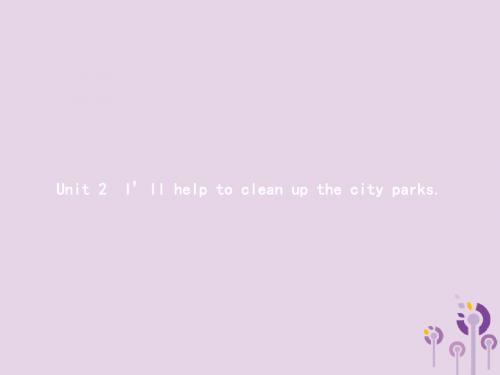
1.The girl could visit the sick kids in the hospital to cheer them up.
这个女孩可以看望生病住院的孩子, 使他们振作起来。 剖析 cheer up意为“使振奋, 使高兴”。up为副词, 其后跟人称代 词作宾语时, 人称代词要放在cheer 与up之间。 Nothing can cheer me up. 没有什么能让我高兴起来。
The news will cheer up all the students. 这则新闻会让所有的学生都振奋起来。
拓展 up构成的动词短语汇总:
call up give up cheer up
get up
给……打电话
放弃 振奋起来 起床
pick up put up set up stay up
拾起; 开车接(某人)
Unit 2 I’ll help to clean up the city parks.
Secห้องสมุดไป่ตู้ion A(1a-2d)
任务:根据Model及方框中的短语, 改写句子
cheer up come up with
Model:The volunteers helped to make the city park clean. The volunteers helped to clean up the city park. 1.The sick boy looks sad.Let’s make him happy. The sick boy looks sad.Let’s cheer him up. 2.The class thought up some good ways to collect money. The class came up with some good ways to collect money.
- 1、下载文档前请自行甄别文档内容的完整性,平台不提供额外的编辑、内容补充、找答案等附加服务。
- 2、"仅部分预览"的文档,不可在线预览部分如存在完整性等问题,可反馈申请退款(可完整预览的文档不适用该条件!)。
- 3、如文档侵犯您的权益,请联系客服反馈,我们会尽快为您处理(人工客服工作时间:9:00-18:30)。
Unit 2 I’ll help to clean up the city parks.综合能力演练I. 单项选择。
1.The women in red _______ a teacher. She works in a hospital now.A. used to beB. is used to beC. was used to beD. is2.— Would you please help me _______,Wang Fei? This question’s too hard for me.— OK.Let me try.A.after B.up C.out D.with3.Don’t shout at him.He is unable to hear you because he is _______.A.blind B.deaf C.hurt D.burnt4.Linda is _______ her mother in many ways.For example,they are both tall and thin.A.similar to B.kind to C.friendly to D.different from5.We all felt nervous when our teacher _______ the test papers to us.A.waited for B.heard from C.gave out D.dealt with6._______ did Ma Ya and Li Qin watch the film,_______ I watched it.A.Either;or B.Neither;nor C.Both;and D.Not only;but also 7.The old man lives _______, but he doesn’t feel _______.A. alone; aloneB. lonely; lonelyC. lonely; aloneD. alone; lonely8.Lisa,please go to the study and _______ me that book.A.take B.pass C.fetch D.carry9.— Natalia Partyka has just beaten Li Jiawei!—It’s hard to _______ a girl with only one arm can play ping-pong so well.A.imagine B.realize C.know D.find10.My grandparents’ clock doesn’t work.I’m trying to find a repairman who can _______ for them.A.fix it up B.fix up it C.put up it D.put it up11.—I have _______ red ink.Can you lend me some?—Sure.Here you are.A.paid for B.come up with C.cleaned up D.run out of12.This big bag is too heavy for the little boy _______.Who volunteers to help him?A.carries B.carrying C.carried D.to carry13.It’s too late for school.I don’t know _______.A.what to do that B.how to do C.what to do D.how to do it14.The window is broken.Please _______ who broke it.A.looked B.found C.find out D.look at15.— Could you please help me carry the box?— _______.A.Thank you B.With pleasure C.It doesn’t matter D.T hat’s all right[真题链接]1. Li Ming used_______ on the right in China, but he soon got used _____ on the left in England. (2015年湖北省孝感市中考)A. to drive; to driveB. driving; drivingC. to driving; to driveD. to drive; to driving2.—What should we do for the disabled children in the Children’s Home? (2015年湖北省黄冈市中考)—You’re supposed to a study group to help them.A.take upB.fix upC.set upD.stay up3. They heard the party was because of the exam. (2015年山东青岛市中考)A.put onB.put upC.put offD.put downII. 完形填空。
Bill,a thirteen-year-old boy,thought he had grown up to be a man.But his parents told him,“You won’t be a real man until you begin to 1 helping others.”One morning,his parents gave him some money to 2 some milk for them.Outside a shop he saw a homeless old man who looked very 3 .Bill went to him and asked,“What’s wrong with you?”The old man answered,“I’m hungry.I haven’t had any food for two days.”All the thought of his parents’ words,Bill said to the old man,“Let’s go to the 4 .”When they got there,Bill asked the waiter to bring out bread and coffee to the old man.The old man finished the meal quickly.After the waiter 5 the plate and the cup,the old man said,“Sorry for give you too much 6 .I’m fine now.I’ll 7 forget your kindness! You are a very good young man”Bill was 8 when he heard this.Just when he wanted to pay for the meal,the waiter came.Bill and the old man learned 9 that he food was free 10 it was the birthday of the boss,and they were the first customer(顾客) that day.1.A.think about B.depend on C.give up D.go on2.A.lend B.buy C.drink D.borrow3.A.afraid B.glad C.sick D.angry4.A.bank B.library C.hospital D.restaurant5.A.sent out B.got down C.gave back D.took away6.A.excuse B.advice C.trouble D.difficulty7.A.never B.always C.usually D.sometimes8.A.nervous B.pleased C.sorry D.shy9.A.in surprise B.as usual C.once again D.at first10.A.when B.until C.unless D.becauseIII. 阅读理解。
ALi Ruyan, 13 and his classmates in Shanghai did something special last summer. They worked in groups with traffic police at different crossroads in the city. Holding small red flags, the students helped keep order and stopped people from jaywalking(乱穿马路).As part of the school project, Li’s school has encouraged its students to do more community(社区)work.After the half day of exhausting work Li told himself not to jaywalk anymore. “I think through community work we get to help others and, more importantly, we grow a sense of responsibility(责任感),” he said.Community service is an important part of education for teenagers around the world.In the US and Canada, high school students need to finish 40 hours of community service before graduation. For those Americans who have finished 1,400 hours of community work, they can be awarded nearly $ 5, 000(33, 000 yuan).Chinese students today do more community work, too. For example, starting from 2010, Sichuan high school students have been asked to do 10 days of community work. It will become part of their school grade.Qian Lijun, 16, and her classmates in Suzhou, Jiangsu went to a local elder care home this winter. They put Spring Festival couplets (对联) on the walls and cheered up the people living there.Li Xiaotian, 15, of Anshan said he used to clear flyers (小广告) from telephone poles (电线杆) with his classmates. They brought tools, towels and buckets and worked for three hours under the summer sun. “It was tiring, but seeing the clean poles without ugly ads —we really felt proud,” he said.1. What was the special thing Li Ruyan did last summer?A. He joined a special group of Class13.B. He became a policeman.C. He helped the traffic police at a crossroad.D. He stopped people from talking.2. From this passage we know that _______.A. Li Ruyan’s school is in the middle of a big city.B. Li Ruyan and his classmates do some community work every day.C. Ruyan and his classmates often hold small flags when they cross the roads.D. Ruyan and his classmates think it is good for them to do some community work.3. Community service ______A. has become a very important part of education only in China.B. is very important in school education in some foreign countries.C. is the only part of the school project for teenagers around the world.D. needs students to finish at least 1,000 hours of community work.4. Which of the following is NOT true according to the passage?A. The students in Shanghai helped people to keep the traffic rules.B. The students in Suzhou visited the old people’s home.C. The students in Anshan cleaned the walls under the summer sun.D. The students in Sichuan sent Spring Festival couplets to the old people.5. Which of the following is NOT true according to the passage?A. Community service helps students grow a sense of responsibility.B. Through community work students get to help others and learn something.C. Students are now encouraged to do more community work in many school in China.D. Students will be awarded much money for doing more community work in Canada and the US. BI and many other people in Britain love charity(慈善) shops because we can find them on every street. The charity shops sell all kinds of things and they are very cheap.The first charity shop was opened by Oxfam in 1947. Now there are over 7,000 charity shops in the UK. My favorite charity shop in my hometown is the Red Cross Shop. There I always find children’s books, all 10 to 20 pence each. They are really cheap.Most of the shop workers in charity shops are volunteers, _________ each shop has a manager and he gets some money. Every morning you see hags of things outside the shops. Some people bring and put them there without waiting for thanks. In fact, over 90% of the things in charity shops are from kind people.All the money the shops get goes to charity work. Charity shops raise more than 110 million pounds every year. The money is for sick and poor children, homeless and disabled people, and many others. In a charity shop you can get cheap but nice things. You might even feel special while shopping.If possible, let’s do something for charity together.6. What do the charity shops sell?__________________________________________________________7. 从短文中找出可以替换下面句子的一句话。
